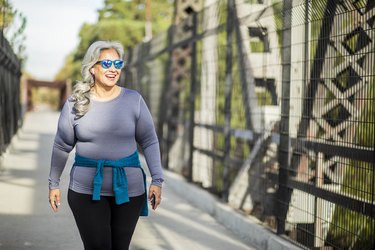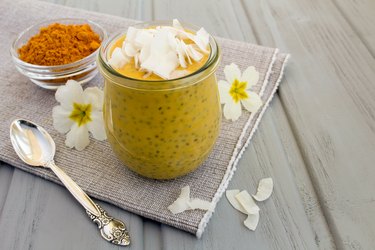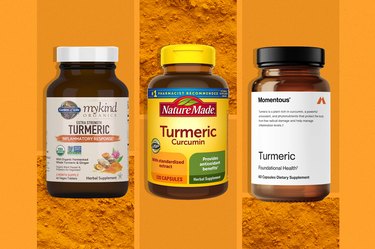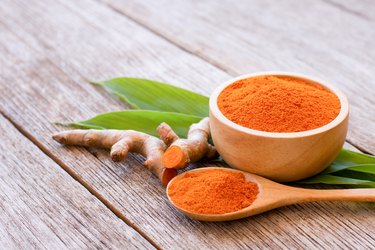
Everyone is fired up about inflammation these days. The number of Google searches for the term quadrupled between June 2011 and June 2021, due in large part to a surge in scientific research into the role inflammation plays in causing and advancing disease.
Here's a quick recap: There are two categories of inflammation. Acute inflammation, which lasts hours or days, is a good thing. It's part of your body's normal immune response that helps fight off infection or stimulate injury healing.
Video of the Day
Video of the Day
But chronic inflammation that stretches on for months or years can wreak havoc on your system. "Ongoing inflammation plays a key role in driving the symptoms and pathophysiology of illness, including cardiovascular disease, diabetes, obesity, cancer and autoimmune disease," says Sunjya Schweig, MD, founder and president of the California Center for Functional Medicine.
Researchers have also been exploring the association between chronic inflammation and brain function, with a March 2019 study in Neurology linking the former to cognitive decline and a 2017 study in Neuropsychiatry highlighting its role in depression. In sum: "Inflammation is a topic of huge importance," Dr. Schweig tells LIVESTRONG.com.
Putting the brakes on chronic inflammation is a smart step toward making your body and brain feel healthier and happier.
So to that end, here are eight quick, easy and scientifically proven ways to reduce inflammation. Try focusing on just one habit each day for the next eight days to help you more easily adopt an inflammation-fighting lifestyle.
Day 1: Eat an Extra Serving of Fruits or Veggies
Go to town at the farmer's market!
"Produce contains anti-inflammatory compounds called phytonutrients," Dr. Schweig says. "It also has a lot of fiber, which feeds the good bacteria in the gut microbiome, which also helps keep inflammation in check."
In a May 2021 review in the Journal of Clinical and Translational Research, phytonutrients significantly reduced inflammation.
Dr. Schweig urges people to incorporate fruits and veg at every meal and snack, aiming for seven to nine servings a day. But even one extra apple or a single handful of baby carrots will make a difference.
Bonus points: Stick to organic produce if you're buying the so-called "dirty dozen," which have the highest levels of pesticide residue.
"Pesticides contribute to an imbalance in our microbiome, disrupt our hormones and affect our immune system, potentially leading to inflammation," Dr. Schweig says. (On the other hand, fruits and veggies on the "clean 15" list tend to have the lowest amount of pesticide residue.)
A January 2022 study in Oxidative Medicine and Cellular Longevity found that pesticide exposure contributes to chronic inflammation, yet antioxidants in fruits and vegetables lessened this chemical's harmful effects.
Related Reading
Day 2: Set a 5-Minute Meditation Reminder on Your Phone
Feeling like you're always stressed out can lead to inflammation. An April 2012 study in PNAS found that when someone is under chronic stress, their body loses the ability to regulate the inflammatory response, leading to runaway inflammation.
So finding your inner calm is a crucial part of quieting inflammation. "Meditation balances your stress system response and triggers your parasympathetic nervous system, which promotes rest and relaxation," Dr. Schweig says.
And you don't need to become a Zen master to see the benefits. "Just five minutes of meditation a day will increase mindfulness — staying present in the current moment," Dr. Schweig says. "Mindfulness helps decrease anxiety about the future as well as regret about the past."
Try a guided meditation on an app like Insight Timer, Calm or Headspace. Meditation apps like these effectively dial down stress, and guided meditations yield the best results, according to an April 2016 analysis in Clinical Psychological Review.
Day 3: Take a 20-Minute Walk

To squash inflammation, get your heart pumping — but without pushing yourself to the max.
"Medium-intensity exercise balances your stress hormones and blood sugar levels to keep inflammation in check," Dr. Schweig says.
A January 2017 study in Brain, Behavior and Immunity found that a single 20-minute session of moderate exercise produced an anti-inflammatory cellular response.
"Exercise also stimulates the lymphatic system, which helps clear out toxins that lead to inflammation," Dr. Schweig says. "In addition, it activates the vagus nerve, which reduces inflammation."
And when it comes to targeting inflammation, a low-key cardio workout — biking, jogging, walking — yields better results than weightlifting or HIIT, which can actually increase inflammation, at least temporarily. "If you're sore the day after a workout, that's a sign that you're in an inflammatory state," Dr. Schweig says.
For extra benefits, walk with a buddy. An April 2014 review in Social Science Medicine suggests that social support from family and friends offered moderate protection against inflammation.
Day 4: Shut Down Your Screens an Hour Before Bed
A good night's sleep helps cure pretty much everything — and chronic inflammation is no exception.
"A large body of evidence shows that people who are sleep-deprived see an uptick of inflammatory chemicals in the body that can lead to an increased risk of disease over time," Dr. Schweig says.
A July 2019 review in Nature confirmed that crappy shut-eye contributed to greater levels of inflammation.
One of the best ways to protect your sleep is to press the "off" button 60 minutes before you hit the hay. "Exposure to the artificial light from screens has a negative impact on our ability to get high-quality sleep," Dr. Schweig says. "In addition, reading the news, scrolling through social media and checking your email can increase stress at bedtime, further impeding restful sleep."
A December 2020 study in the Journal of Clinical Sleep Medicine found that people who used their phones in the hour leading up to bedtime were more than twice as likely to report getting too little sleep and feeling exhausted during the day.
In fact, the study discovered that simply having a device next to your bed, even if you don't look at it, significantly disrupted sleep and led to next-day fatigue. So for optimal results, keep your phone outside the boudoir altogether.
Day 5: Have Yogurt for Breakfast
Getting your probiotic fix is clutch when it comes to fighting inflammation.
"Probiotic-rich foods like kimchi, yogurt and sauerkraut encourage a healthy gut microbiome," says Nooshin Hosseini, MD, clinical assistant professor of gastroenterology at New York University. "Since bad bacteria can lead to systemic inflammation, there is a theory that eating foods with high levels of good bacteria might potentially reduce inflammation."
Day 6: Don’t Snack After Dinner

Put the kibosh on late-night munchies. A February 2020 review in The New England Journal of Medicine found that intermittent fasting (or time-restricted eating) reduced inflammation.
"Aim to eat all of your meals within an 8- to 12-hour window," Dr. Schweig says. "Time-restricted feeding limits inflammation by increasing cellular turnover to eliminate damaged cells and prevent blood sugar swings."
Cellular damage and roller-coaster blood pressure levels both trigger inflammation, according to Dr. Schweig.
For best results, cluster your meals early in the day rather than later and have a light supper. An August 2015 study in PLOS One found that cutting down the amount you eat in the evening and extending the time between dinner and breakfast the next day lowered systemic inflammation. Every 10 percent increase in calories consumed between 5 p.m. and midnight was associated with a 3 percent increase in inflammatory markers.
Day 7: Pull a Few Weeds in the Garden
A little dirt don't hurt — and actually, it's good for your gut.
A February 2022 study in the International Journal of Environmental Research and Public Health found that spending time in nature reduced inflammation, thanks to the plethora of good bacteria you're exposed to when you're in the great outdoors.
Don't have an outdoor space right outside your door? Plan a weekend hike or picnic with pals, or simply commit to eating your lunch in the open air at least once a week.
Day 8: Sprinkle Turmeric on Your Lunch
Put the curry pot on!
"There are a few small studies showing that curcumin, a polyphenol in turmeric, may help with inflammation," Dr. Hosseini says. For example: "Taking a curcumin supplement was found to reduce inflammatory bowel disease."
And according to an October 2017 study in Foods, even relatively low doses of this Indian spice had anti-inflammatory effects, especially when combined with black pepper.
So whip up a warming bowl of dahl for dinner — or simply add a pinch of turmeric to everything from eggs to stir fry to soup.
- Neurology: "Systemic inflammation during midlife and cognitive change over 20 years"
- Neuropsychiatry: "Depression and Inflammation: Disentangling a Clear Yet Complex and Multifaceted Link"
- Oxidative Medicine and Cellular Longevity: "Reactive Oxygen Species in Inflammation and Tissue Injury"
- Journal of Clinical and Translational Research: "The effects of twenty-four nutrients and phytonutrients on immune system function and inflammation: A narrative review "
- PNAS: "Chronic stress, glucocorticoid receptor resistance, inflammation, and disease risk"
- Clinical Psychological Review: "Effectiveness of online mindfulness-based interventions in improving mental health: A review and meta-analysis of randomised controlled trials"
- Brain, Behavior and Immunity: "Inflammation and exercise: Inhibition of monocytic intracellular TNF production by acute exercise via β2-adrenergic activation"
- Social Science Medicine: "Social support, social strain and inflammation: Evidence from a national longitudinal study of U.S. adults"
- Nature: "Sleep and inflammation: partners in sickness and in health"
- Journal of Clinical Sleep Medicine: "Bedtime screen use in middle-aged and older adults growing during pandemic"
- The New England Journal of Medicine: "Effects of Intermittent Fasting on Health, Aging, and Disease"
- PLOS One: "Frequency and Circadian Timing of Eating May Influence Biomarkers of Inflammation and Insulin Resistance Associated with Breast Cancer Risk"
- International Journal of Environmental Research and Public Health: "Greenspace, Inflammation, Cardiovascular Health, and Cancer: A Review and Conceptual Framework for Greenspace in Cardio-Oncology Research "
- Foods: "Curcumin: A Review of Its’ Effects on Human Health"
Is this an emergency? If you are experiencing serious medical symptoms, please see the National Library of Medicine’s list of signs you need emergency medical attention or call 911.











